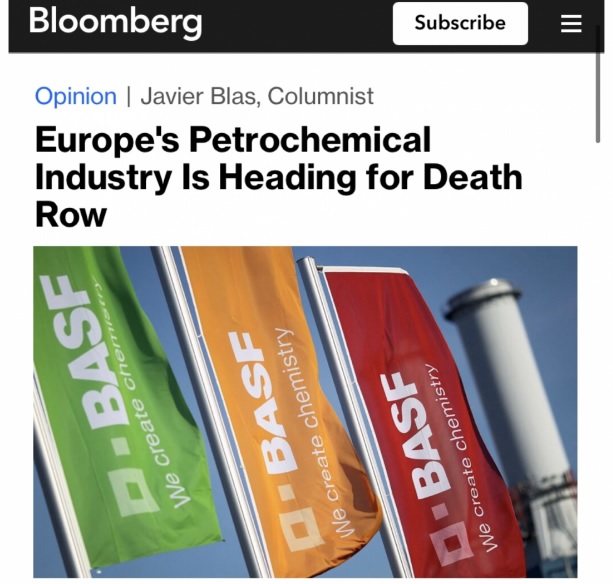
The European’s manufacturers are importing the building blocks to make plastic from overseas as energy prices make domestic production too costly, notes Bloomberg.
The last time European petrochemical plants processed so little of their favorite feedstock, Sweden’s ABBA was the most popular band on the continent, and the Fall of Saigon had marked the end of the Vietnam War. It was 1975, and the region was still licking its wounds after the first oil crisis. Nearly half a century later, the industry is dying.
It would be a mistake to interpret this as a triumph in the fight against plastics. Europe keeps consuming voracious amounts of foams, paints, resins and every other product petrochemical factories make. It’s just replacing indigenous production with imported stuff.
Europe's consumption of naphtha, the cornerstone of the petrochemical industry, will drop in 2023 to a nearly 50-year low, down 40% from its peak.

Petrochemicals are intrinsically energy intensive. In Europe, natural gas is about five times more expensive than in the US. Right now, it’s cheaper to buy ethylene, a building block for plastics, in Texas, and ship it across the Atlantic for further processing in Europe than producing it at home. And that’s precisely what petrochemical companies tell me they’re doing. The net result is loss of economic activity in Europe, an erosion of the bloc’s trade balance in chemical products and, ultimately, the loss of jobs and energy security.
On average, a European person consumes around 150 kilograms of plastic a year, more than twice the global average of 60 kilograms, according to the European Environment Agency. Plastics are everywhere – from food packaging to construction materials, from mobile phones to clothes.
Next, the data. The petrochemical industry runs largely on two feedstocks: natural gas and naphtha, with the latter being a byproduct of refining oil, similar in some ways to gasoline. According to the International Energy Agency, European naphtha consumption will drop this year to a 48-year low of 34.2 million metric tons. Usage is down 18.5% from pre-Covid-19 levels, and almost 40% below the all-time high set two decades ago.
With processing so low, the industry’s workhorses, called steam crackers, where the naphtha and the gas is transformed into chemical building blocks, are operating at uneconomical rates. Because of their enormous fixed costs, companies typically run their steam crackers as close to capacity as they can throughout the year. Anything below 90% is a source of concern; 85% is bad, and 80% is seen as catastrophic. In recent quarters, however, they have run at loss-making rates of between 65% and 75% of their capacity.
In private, industry executives say they can only lose money for so long — so closures look certain in 2024. Using a more diplomatic language, the IEA said that “it is increasingly difficult to see how the continent’s petrochemical industry can recover its previous strength.” I have spent the last few weeks talking to industry executives, and the answer they give is “it won’t — period.”
European companies are adapting accordingly. When BASF SE, the company synonymous with petrochemicals in Europe, met investors a couple of weeks ago, its executives wanted to talk about anything but their home base. Look at their slide presentation, and prominent is the construction of a new factory in Zhanjiang, China, with a $10 billion price tag.
Across European chemical companies, the proportion of spending in new projects into Asia has jumped by about 50% during the past decade and a half, according to estimates by Jefferies Financial Group Inc., an investment bank.
How does that translate to the economy? Before the pandemic, Europe’s chemical trade balance with the rest of the world was typically in the black to the tune of $40 billion. Last year, the surplus narrowed to just $2.5 billion. Although it’s likely to recover somewhat in 2023, the outlook for 2024 is somber, Bloomberg concludes.
read more in our Telegram-channel https://t.me/The_International_Affairs

 11:50 24.11.2023 •
11:50 24.11.2023 •






















